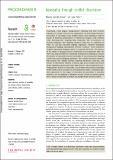Files in this item
Eusociality through conflict dissolution
Item metadata
| dc.contributor.author | Gonzalez Forero, Mauricio | |
| dc.contributor.author | Peña, Jorge | |
| dc.date.accessioned | 2021-04-21T08:30:34Z | |
| dc.date.available | 2021-04-21T08:30:34Z | |
| dc.date.issued | 2021-04-28 | |
| dc.identifier | 273457537 | |
| dc.identifier | 4fcfd102-b089-4c43-825d-dbe099bf0c46 | |
| dc.identifier | 85105905276 | |
| dc.identifier | 000642210600013 | |
| dc.identifier.citation | Gonzalez Forero , M & Peña , J 2021 , ' Eusociality through conflict dissolution ' , Proceedings of the Royal Society B: Biological Sciences , vol. 288 , no. 1949 , 20210386 . https://doi.org/10.1098/rspb.2021.0386 | en |
| dc.identifier.issn | 0962-8452 | |
| dc.identifier.other | ORCID: /0000-0003-1015-3089/work/92775571 | |
| dc.identifier.uri | https://hdl.handle.net/10023/23064 | |
| dc.description | Funding: M.G.F. acknowledges funding from St Andrews’ School of Biology. J.P. acknowledges IAST funding from the French National Research Agency (ANR) under the Investments for the Future (Investissements d’Avenir) program, grant ANR-17-EURE-0010. | en |
| dc.description.abstract | Eusociality, where largely unreproductive offspring help their mothers reproduce, is a major form of social organization. An increasingly documented feature of eusociality is that mothers induce their offspring to help by means of hormones, pheromones or behavioural displays, with evidence often indicating that offspring help voluntarily. The co-occurrence of maternal influence and offspring voluntary help may be explained by what we call the converted helping hypothesis, whereby maternally manipulated helping subsequently becomes voluntary. Such hypothesis requires that parent-offspring conflict is eventually dissolved—for instance, if the benefit of helping increases sufficiently over evolutionary time. We show that help provided by maternally manipulated offspring can enable the mother to sufficiently increase her fertility to transform parent-offspring conflict into parent-offspring agreement. This conflict-dissolution mechanism requires that helpers alleviate maternal life-history trade-offs, and results in reproductive division of labour, high queen fertility and honest queen signalling suppressing worker reproduction—thus exceptionally recovering diverse features of eusociality. As such trade-off alleviation seemingly holds widely across eusocial taxa, this mechanism offers a potentially general explanation for the origin of eusociality, the prevalence of maternal influence, and the offspring’s willingness to help. Overall, our results explain how a major evolutionary transition can happen from ancestral conflict. | |
| dc.format.extent | 8 | |
| dc.format.extent | 600006 | |
| dc.language.iso | eng | |
| dc.relation.ispartof | Proceedings of the Royal Society B: Biological Sciences | en |
| dc.subject | Major transitions | en |
| dc.subject | Evolution of eusociality | en |
| dc.subject | Kin selection | en |
| dc.subject | Parental manipulation | en |
| dc.subject | Parent-offspring conflict | en |
| dc.subject | Evolutionary dynamics | en |
| dc.subject | QH301 Biology | en |
| dc.subject | DAS | en |
| dc.subject.lcc | QH301 | en |
| dc.title | Eusociality through conflict dissolution | en |
| dc.type | Journal article | en |
| dc.contributor.institution | University of St Andrews. Centre for Biological Diversity | en |
| dc.contributor.institution | University of St Andrews. School of Biology | en |
| dc.identifier.doi | https://doi.org/10.1098/rspb.2021.0386 | |
| dc.description.status | Peer reviewed | en |
This item appears in the following Collection(s)
Items in the St Andrews Research Repository are protected by copyright, with all rights reserved, unless otherwise indicated.

